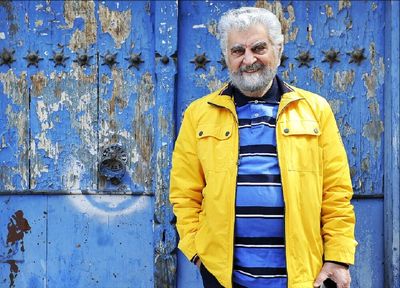He made the remarks after director Narges Abyar announced her plans in early October to make a film based on the bestselling novel by the acclaimed Iranian writer Simin Daneshvar, who was the widow of the renowned writer Jalal Al-e Ahmad.
Motavasselani signed a contract with Daneshvar in 1985 for his project due to a close relationship between his wife, Mihan Bahrami, and the writer. The friendship was built after Bahrami had previously written a review of the novel, which focuses on the life of a Persian family during the Allied occupation of Iran in World War II.
To show his respect for Daneshvar, Motavasselani called her “lady” throughout his recent interview with the Persian service of ISNA.
“Our relationship with Mrs. Daneshvar developed in 1985 when my wife wrote a review of ‘Savushun’ for a radio program,” he said.
Afterwards, Daneshvar called Motavasselani’s wife to get her permission to publish the review at the beginning of the Polish edition of her novel.
This call initiated their lasting friendship, which continued until Daneshvar’s death in 2012. Motavasselani’s family was presented with valuable presents from Daneshvar, including a pipe and a cane belonging to Al-e Ahmad.
Daneshvar had watched Motavasselani’s 1985 box office hit “Mirza Noruz’s Shoes”, and subsequently she agreed to his request for making a movie based on “Savushun” and the contract was signed.
He failed to convince any producer to team up with him on this big-budget project.
Following Daneshvar’s death, Motavasselani granted the contract and Al-e Ahmad’s pipe and cane to a museum, which was the house of the writers.
Motavasselani said that an Italian director later asked Daneshvar to make a film based on “Savushun”. However, she rejected the request after consultation with Motavasselani’s wife.
According to Motavasselani, directors Davud Mollapur, Rakhshan Bani-Etemad and Bahman Farmanara also planned to make films based on the novel, but their plans were canceled for different reasons.
About Abyar’s plan to make a film based on “Savushun”, Motavasselani said, “Ms. Leili Riahi, the adopted daughter of Daneshvar, is her executor; if there is a contract, it has likely been signed by her… anyway, I’m uninformed about it.”
“Making the film was a wish, which, unfortunately, was not fulfilled,” he lamented.
“Savushun” is set in Shiraz, a town that evokes images of Persepolis and pre-Islamic monuments, the great poets, the shrines of Sufis, and nomadic tribes within a historical web of the interests, privilege and influence of foreign powers; corruption, incompetence and arrogance of persons in authority; the paternalistic landowner-peasant relationship; tribalism; and the fear of famine.
The story is seen through the eyes of Zari, a young wife and mother, who copes with her idealistic and uncompromising husband while struggling with her desire for traditional family life and her need for individual identity.
The heroic stand taken by the southern family against British colonial intrigues ends in the murder of the husband, with the wife determined to carry on the struggle.
Source:Tehran Times

